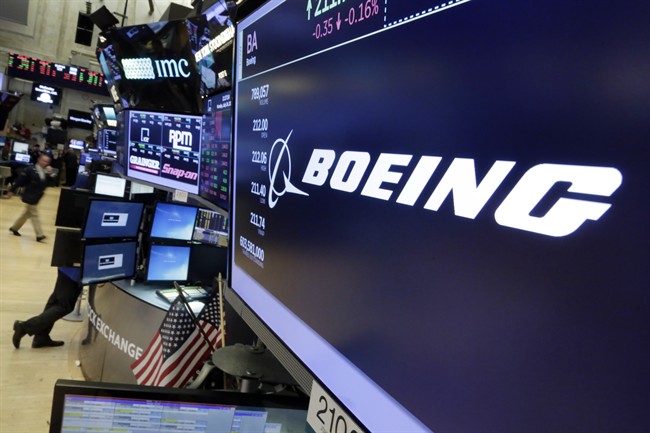When the Quebec government and Ottawa stepped in to shore up a struggling Bombardier with cash for its prized CSeries aircraft, danger was lurking, according to William Mitchell, professor of strategic management at the University of Toronto’s Rotman School of Management.

Sure enough, not too long afterwards, Boeing filed a complaint with the U.S. government alleging that Canada’s airplane manufacturer was encroaching on its home turf by selling CSeries aircraft on the cheap (to Delta Air Lines in the specific case) thanks to government subsidies. Now, Washington has slapped a preliminary 219 per cent import duty on Bombardier that’s meant to counteract the effect of those subsidies and help level the playing field.
READ MORE: Bombardier: A step-by-step guide to the trade dispute
“They left themselves open to that by needing financial help,” Mitchell said, speaking about Bombardier.
Sure, developing the CSeries, a whole new line of mid-size commercial aircraft was a big bet for Bombardier, which has until recently only dabbled in the regional jet market. It has sunk about $6 billion in the CSeries so far. But a company as old and established as Bombardier should have been able to handle that without government handouts, argues Mitchell.
In part, Bombardier has itself to blame.
READ MORE: COMMENTARY: Sorry to be unpatriotic, but I’m kind of glad the U.S. spanked Bombardier
But there’s another story about subsidies in this intricate cross-border trade drama – and it is about Boeing. The U.S. aircraft manufacturing giant is among the top recipients of both federal, state and local subsidies in the U.S., according to a tally compiled by Good Jobs First, a Washington-based organization.
The company received $457 million in federal grants, which are typically non-repayable, between 2000 and 2014. In addition to that, there was a whopping $64 billion in federal loans and loan guarantees.
WATCH: How should Canada Respond to the Hefty Tariff Slapped on Bombardier?

That, combined with $18 billion in contract awards in fiscal 2014 alone, make Boeing “exceptionally favored by Uncle Sam,” notes the report.
But that’s not all. Boeing also received an eye-popping $13 billion in state and local subsidies over the same 15-year period.
The U.S. aircraft maker also has another key advantage: military contracts.
READ MORE: Canadian industries concerned about knock-on effects of Bombardier tariffs
Thirty-six per cent of Boeing’s $94.5 billion revenue for 2016 came from the U.S. Department of Defense (U.S. DoD), according to the company’s financial statements.
Those military dollars are an “indirect help” for Boeing’s commercial aircraft business, noted Mitchell.
READ MORE: Quebec fights back after Bombardier slapped with 219% duty
Even if one assumes modest spillover from the research and development (R&D) activity that Boeing conducts on behalf of the U.S. DoD, “the R&D resources they have and the scale they’re able to generate by virtue of their military business gives them inherent advantages,” said Jesse Goldman, partner at Bennett Jones in Toronto.
Bombardier, by contrast, doesn’t even rank as one of the major recipients of Canada’s much smaller defence spending.
Still, that’s not to say Boeing is an outlier in the aerospace industry. Indeed, gobbling up government dollars is the norm.
“The aerospace industry – I don’t care what country you’re in – is highly, highly subsidized by domestic governments,” said Goldman.
WATCH: What is going on with the Bombardier, Boeing dispute?

It’s not about the money, it’s about the rules – and politics
So what’s the brouhaha about the money pocketed by Bombardier?
The issue is whether they contravened international trade rules set by the World Trade Organization, which referees global trade.
Countries don’t really care about other countries’ subsidies unless they feel that those dollars are propping up foreign competitors that start harming their domestic companies and industries. That’s when WTO rules allow for the imposition of import duties, after thorough investigation, in order to cancel out the impact of the subsidies.
WATCH: The politics of America’s big tariff on Bombardier

Boeing has made a case that Canada’s cash infusions to Bombardier break the rules. And the U.S. government is taking that complaint seriously.
(Boeing didn’t compete for the Delta contract Bombardier won but argues that the CSeries represents competition for its flagship 737 narrowbody aircraft.)
The fact that Boeing also receives loads of government money isn’t a legal argument in this case, noted Goldman.
From a legal standpoint, however, Canada can and is challenging the notion that the money Bombardier received from the Canadian government really fits the WTO definition of a subsidy that would justify import duties, according to Goldman.
READ MORE: Britain’s May ‘bitterly disappointed’ with Bombardier tariff decision
After all, Bombardier will have to repay the $372.5 million in financial help recently pledged by Ottawa. And Quebec’s $1 billion contribution was in exchange for a 49.5 per cent equity stake in the CSeries program, which you might call “an investment,” said Mitchell.
“You can be sure that Bombardier received extensive legal opinions before they accepted any of this money from either the Quebec or the Canadian government,” said Goldman.
Bombardier, Ottawa and Quebec all made “a major effort to make sure this would be bulletproof” under international trade law, said Goldman.
But Canada’s aircraft maker faces a tough political environment in the U.S., one where the Trump administration has considerably ramped up its review of trade remedy cases.
In such a climate, taking no money at all might have been the only truly bulletproof strategy.




Comments